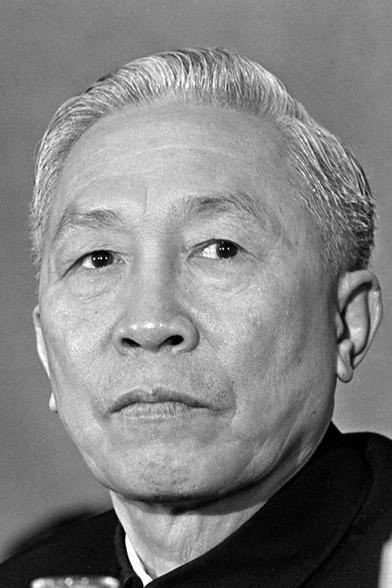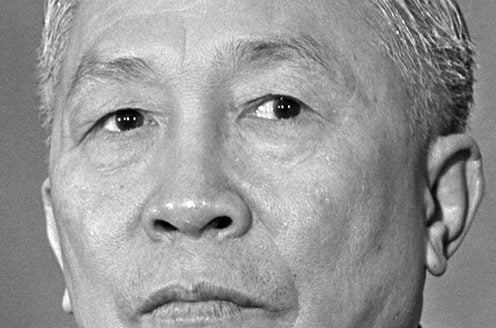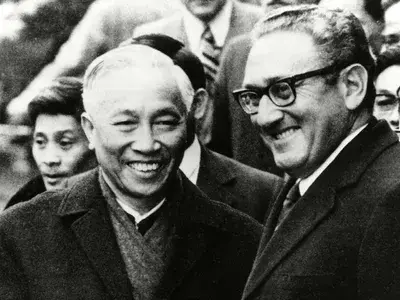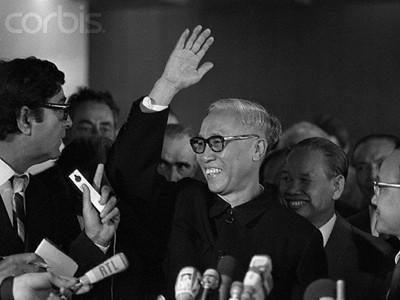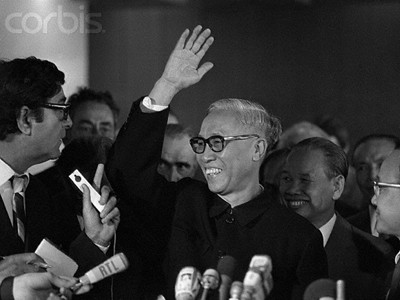In his book “Our Vietnam: The War 1954–1975,” U.S. journalist A.J. Langguth says that despite Kissinger’s protestations for Tho to be quiet, during one session of the talks he shouted at Kissinger for over an hour:
“For more than ten years, America has used violence to beat down the Vietnamese people-napalm, B-52s. But you don’t draw any lessons from your failures. You continue the same policy. Ngu xuan! Ngu xuan! Ngu xuan!”
The translator refused to tell Kissinger what Ngu xuan meant (massively stupid) for fear of causing offence.
Luu Van Loi, who was with Tho at the conference as a member of the negotiating team, wasn’t happy with #Kissinger either. “Kissinger was dodgy; he always brought up irrelevant matters at the start of meetings, and only mentioned the important stuff out for discussion at night. He must have thought that the old Le Duc Tho was sleepy and tired. But he knew nothing about Tho! The longer the negotiation went, the more alert Tho got.”
Kissinger seemed to agree with Luu Van Loi when he expressed his astonishment: “Sometimes he talked for hours straight. I said, ‘I’ve heard this countless times,’ but Tho responded ‘You’ve heard it countless times but you haven’t remembered it, let me repeat…’”
Thọ told Kissinger at their first meeting that "Vietnamization" was doomed, dismissively saying in French: "Previously, with over one million U.S and Saigon troops, you have failed. Now how can you win if you let the South Vietnamese Army fight alone and if you only give them military support?"
In April 1970, Thọ broke off his meetings with Kissinger, saying that there was nothing to discuss. An attempt by Kissinger to talk to Thọ again in May 1970 was rejected with a note reading "The U.S. words of peace are just empty ones"
In July 1971, Kissinger taunted Thọ with news that President #Nixon would be visiting China soon to meet #MaoZedong, telling him that the days when the North Vietnamese could count of the supply of Chinese arms were coming to close. Thọ showed no emotion: "That is your affair. Our fighting is our preoccupation, and that will decide the outcome for our country. What you have told us will have no influence on our fighting".
2 May 1972, Thọ had his 13th meeting with Kissinger in Paris. The meeting was hostile; the North Vietnamese had just taken Quang Tri City in South Vietnam, which led Nixon to tell Kissinger "No nonsense. No niceness. No accommodations". During the meeting, Thọ mentioned that Senator William Fulbright was criticizing the Nixon administration, leading Kissinger to say: "Our domestic discussions are no concern of yours". Thọ snapped back: "I'm giving an example to prove that Americans share our views". When Kissinger asked Thọ why North Vietnam had not responded on a proposal he sent via the Soviet Union, Thọ replied: "We have on many occasions said that if you have any question, you should talk to directly to us, and we shall talk directly to you. We don't speak through a third person".
August 1972, Kissinger promised Thọ that he would pressure Nguyễn Văn Thiệu to resign if Thọ agreed to a peace deal before US presidential elections. Thọ told Kissinger that the timetable for Thiệu's departure was no longer an immediate concern & he wanted some $8 billion in reparations for the war damage. Kissinger told Thọ that he wanted to tell the world about their secret meetings since 1970 to give the impression that Nixon was making progress on peace in Vietnam, a suggestion Thọ rejected, saying it's not his job to assist Nixon's reelection campaign.
20 November 1972, Kissinger met Thọ again in Paris. Kissinger no longer aimed at secrecy & was followed by paparazzi as he went to a house owned by the French Communist Party where Thọ was waiting for him. Kissinger announced the Americans wanted major changes to the peace agreement made in October to accommodate Thiệu, which led Thọ to accuse him of negotiating in bad faith.
Thọ: "We have been deceived by the French, the Japanese and the Americans. But the deception has never been so flagrant as of now".
Putting more pressure, Nixon told Kissinger to break off talks if Thọ wouldn't agree to changes he wanted. Kissinger told Nixon: "While we have a moral case for bombing North Vietnam when it does not accept our terms, it seems to be really stretching the point to bomb North Vietnam when it has accepted our terms and when South Vietnam has not". December 1972, talks had broken & Nixon decided to resume bombing North Vietnam.
After the Christmas bombings of 1972, Thọ was in particularly savage mood towards Kissinger.
8 January 1973 in a house in the French town of Gif-sur-Yvette, Kissinger arrived to find nobody at the door to greet him. When Kissinger entered the conference room, nobody spoke to him. Sensing the hostile mood, Kissinger speaking in French said: "It was not my fault about the bombing". Before Kissinger could say anymore, Thọ exploded in rage, saying in French:
"Under the pretext of interrupted negotiations, you resumed the bombing of North Vietnam, just at the moment when I reached home. You have 'greeted' my arrival in a very courteous manner! You action, I can say, is flagrant and gross! You and no one else strained the honor of the United States"
"You've spent billions of dollars and many tons of bombs when we had a text ready to sign". Kissinger replied: "I have heard many adjectives in your comments. I propose that you should not use them". Thọ answered: "I have used those adjectives with a great deal of restraint already. The world opinion, the U.S. press and U.S. political personalities have used harsher words".
#AsianMastodon #Vietnam #VietnameseRevolutionaries #ColonialResistance #Communist #VietnameseHistory #AsianHistory #SouthEastAsia #Viet #Geopolitics #USWarOnVietnam #LongLiveVietnam #VietnameseSovereignty #LearnHistory #TootSEA
